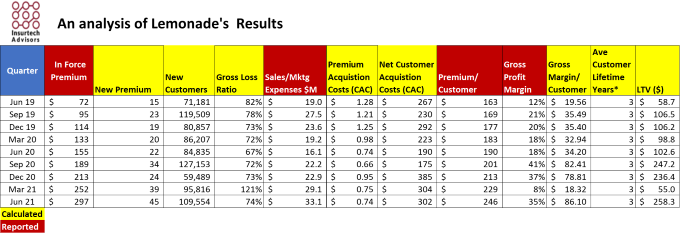The most successful Insurtech on the public markets, Lemonade, announced its results for the second quarter. It is a story of an improving and growing but highly unprofitable business, increasing its customer base by 10% to 1.2 million. At the same time, they increased their premium by 18% to $297 million. The result of this is reflected in the fact that their average premium is now $246. Much of this is driven by the fact that they have diversified their product mix in the following ways:
- Renters: 56% or $166M
- Homeowners: 30% or $89M
- Pets: 13% or $39M
- Life: 1% or $3M

Table of Contents
Customer Distribution
When trying to link premium growth to premium distribution to the customer, I came up with the following.

It seems that they are still recruiting renters, selling pet insurance, and reaching far fewer homeowners.
Revenue and Expenses
The cost of acquiring Lemonade customers is still too high to be sustainable. They attract a new customer for $302, but only earn $246 in premium for that customer in the first year. Their gross revenue of $28 million earned them $23 per customer per quarter or just under $100 per year. Simply put, they spend 3 times more on acquiring a customer than the gross revenue they generate in a year. They had a net loss of $55.6 million. For every dollar they earn, they lose two.
Lemonade’s premium retention rate has stabilized at 80%, but given its current spending profile, this is also contributing to its economic challenge.
Why the public market loves Lemonade
When you think about why Lemonade was positively received by the public market and why Root, Metromile and Hippo had a greater challenge, one thing becomes clear: Lemonade began with a product that ignored the legacy of carriers. It was an “accommodation product.” They needed something to offer their agents and policyholders whose children moved out of the house. They paid no attention to the product. They did not modernize the product or the way it was sold until Lemonade gained a market presence.
They were able to capture the minds of the new consumers and built up a kind of cult brand following that allowed them to position themselves as leaders in the minds of investors and the renting public.
What to do about Lemonade
The biggest lesson is that if you have products that have not been modernized for many years, you should start to deal with it. This can be either by reworking the product or even by white labeling someone else’s more modern product. This last point allows you a source of income without the capital implications. Which might be beneficial for some products. More importantly, it will allow you to focus your capital on the products where you have a strong competitive advantage.
Please reach out if you have any questions or comments or want to discuss anything else related to the recent Insurtechs going public or what other Insurtech areas are seeing traction.
Insurtech Advisors helps regional insurance carriers and agencies to partner with the best Insurtechs that will enable you to succeed and continue to meet the needs of your members, staff, and independent agents. We know your business, and we know the Insurtech landscape. We save you countless hours of wasted time and false starts. We work closely with your team to identify opportunities and objectives and then personally curate for you and introduce you to the best Insurtechs to pilot.

Kaenan is a professional in the areas of block chain, telematics, wearables, analytics, artificial intelligence (AI) and Insurtech. He has played a key role in innovating many start-ups and established carriers. His advice has been widely appreciated in the financial community, which resulted in multiple quotes and publications in various media.
Most recently he was Practice Lead for Innovation, Fintech, and Strategic Insights at EY. Throughout his career he has held leading roles within Marketing Strategy and Decision Management with top Insurance, Banking and Finance companies, including USAA, Citibank and Sallie Mae.